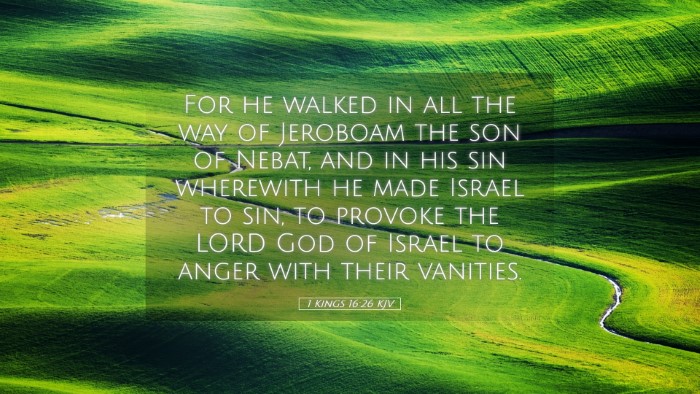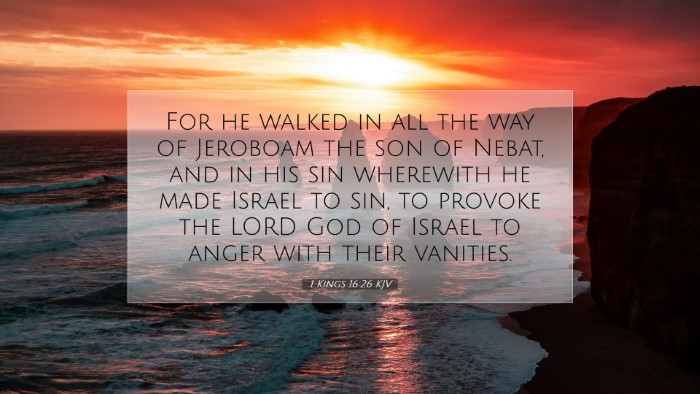Commentary on 1 Kings 16:26
Verse Text: "For he walked in all the way of Jeroboam the son of Nebat, and in his sin wherewith he made Israel to sin, to provoke the LORD God of Israel to anger with their vanities."
Introduction
This verse presents a sobering evaluation of King Omri's legacy, illustrating the moral and spiritual decline characteristic of the northern kingdom of Israel. The focus on Jeroboam's influence underscores the danger of idolatry and the resultant consequences of turning from the Lord.
Historical Context
Omri rose to power amidst a divided kingdom, and his reign is noted for significant political consolidation and military achievements. However, the spiritual state of Israel during his reign remained deeply troubling. This commentary synthesizes insights from public domain commentaries to illuminate the significance of Omri's actions as they pertain to Israel's covenant relationship with God.
Analysis of Key Themes
1. The Legacy of Jeroboam
Omri's walk in the ways of Jeroboam highlights the continuing influence of the first king of Israel's northern kingdom. Jeroboam's introduction of idolatry established a precedent that subsequent kings would follow.
- Idolatry: Matthew Henry notes the detrimental effect of Jeroboam's sin, establishing a pattern of rebellion against God that permeated Israel's history.
- Provocation of God: Albert Barnes emphasizes that these sins provoked the Lord to anger, showcasing a recurring theme where idolatry leads to divine judgment.
- Collective Sinfulness: Adam Clarke observes that the communal nature of sin is underscored by the phrase "made Israel to sin," indicating that Jeroboam's actions had far-reaching implications for the entire nation.
2. The Nature of Idolatry
The reference to "vanities" serves as a powerful reminder of the emptiness of idol worship. Each commentator underscores the futility of turning to false gods and the corresponding neglect of Yahweh.
- Spiritual Foolishness: Henry refers to the "vanities" as distractions that lead God's people away from true worship.
- Compromise and Corruption: Barnes points out that the worship of idols indicates a broader societal corruption, permanently affecting Israel's identity as God's chosen people.
- Call to Repentance: Clarke offers a call to recognize the vanity of worldly pursuits that fill the void left when divine worship is neglected.
3. The Anger of the Lord
This verse climaxes with the wrath provoked by Israel's sins. It captures the profound theological truth that sin has consequences.
- Divine Judgment: Henry alludes to the inevitable judgment that follows persistent sin, reflecting the seriousness of Omri's continued rebellion.
- God's Faithfulness vs. Human Unfaithfulness: Barnes highlights the contrast between God's covenant faithfulness and Israel's unfaithfulness through their idolatries.
- Moral Accountability: Clarke emphasizes that God's anger is not arbitrary, but a just response to the moral failings of His people.
Theological Implications
This verse serves as a poignant reminder to contemporary believers about the seriousness of idolatry—whether it be physical statues or the more subtle idols of the heart such as power, wealth, or personal autonomy.
- Warning to Believers: The account calls for self-examination regarding areas in life that may lead one away from true worship.
- Restoration through Repentance: There is hope in recognizing sin and returning to God, as seen through the latter chapters of Kings, where calls for repentance are issued.
- Understanding God’s Nature: God’s anger should compel believers to understand His holiness and the call to live in accordance with His will.
Conclusion
1 Kings 16:26 encapsulates a crucial turning point in Israel's narrative, one that warns against the dangers of deviating from God's path. By understanding the implications of Omri's choices and Jeroboam's legacy, pastors, theologians, and scholars are reminded of the critical importance of fidelity to God in both individual and communal faith practice. This verse provides fertile ground for teaching and reflecting on the dynamics of faithfulness, sin, and the nature of divine relationship.


